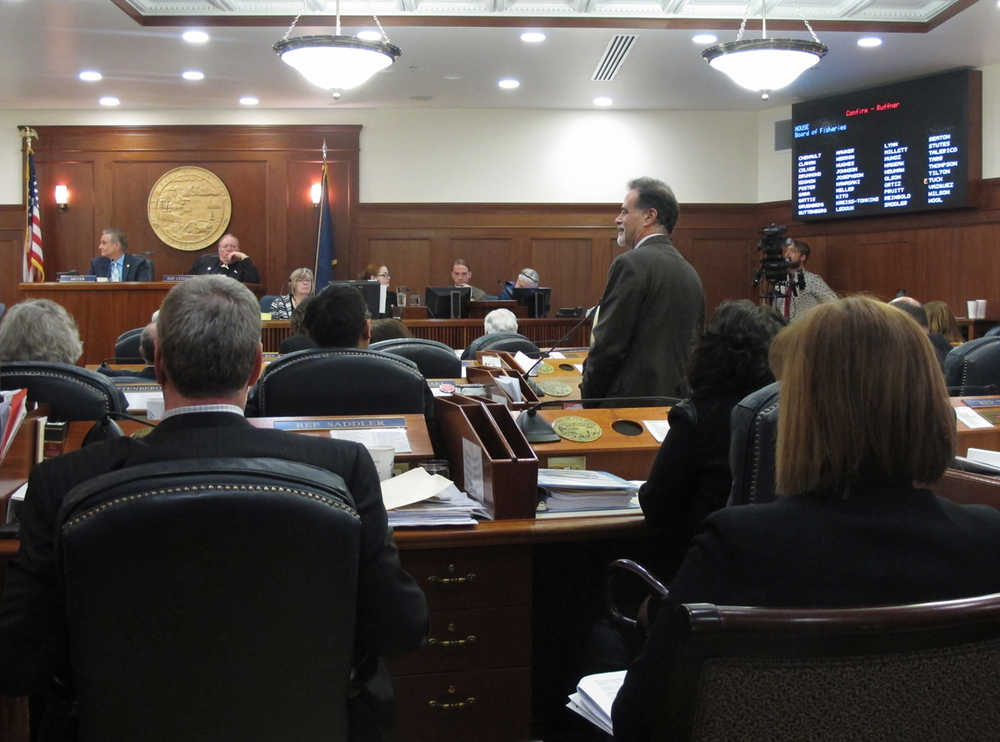The Alaska Legislature failed to confirm a Soldotna conservationist for a seat on the Alaska Board of Fisheries.
The confirmation for Gov. Bill Walker’s appointee, Robert Ruffner, was defeated with 29 lawmakers in favor and 30 against, during a joint legislative session on Sunday in Juneau. The board sets fishing regulations for the state and sets allocation in a multi-billion dollar fishing industry.
Walker appointed Ruffner after his first appointment — Kenai Peninsula resident Roland Maw — resigned the appointment suddenly. Maw is currently facing charges of falsifying his residency status in Montana.
Ruffner is the outgoing executive director of the conservation organization the Kenai Watershed Forum. He has not actively participated in fisheries politics on the side of sport, commercial or personal-use fishing for Cook Inlet fish. However, Board of Fisheries appointments have traditionally been contentious and Ruffner’s nomination was no different. Aides from the offices of Rep. Shelley Hughes, R-Palmer, and Rep. Scott Kawasaki, R-Fairbanks, said legislators had been flooded with emails in the days leading up to the confirmation hearing. Both Kawasaki and Hughes voted against Ruffner’s appointment.
Rep. Les Gara, R-Anchorage, said he had not received a lot of feedback on Ruffner’s appointment. Gara said he wanted someone in the seat who cared about habitat. He said he did not like the idea that board seats should be allocated to an advocate for one user group.
“I get tired of hearing that somebody has to either be pro-commercial fish or pro-subsistence or pro-sportfish,” he said. “I want somebody who cares about all the fisheries and who cares about protecting the habitat and who cares about the interests of all our user groups.”
Gara voted in support of Ruffner’s appointment.
Ruffner said after the hearing that he was proud of how he’d represented himself as a resident of the Kenai Peninsula.
“It is my opinion that the statutes governing the qualification and selection criteria of fish board members has been hijacked by adversarial user groups; this was a key underlying message in my presentation to lawmakers,” he wrote in an email.
Several organizations publicly supported Ruffner including the city councils of Kenai and Soldotna, the Aleutians East Borough, the Kenaitze Indian Tribe, the Kenai Area Fishermen’s Coalition. Supporters cited Ruffner’s longtime habitat advocacy and support of fish passage projects on the Kenai Peninsula among their reasons for wanting him to serve on the board.
Opponents of Ruffner’s nomination included the Kenai River Sportfishing Association, the Kenai River Professional Guides Association, the Southeast Alaska Guides Organization and the Alaska Outdoor Council.
Among their criticism of Ruffner included accusations that his supporters were primarily commercial fishermen, so Ruffner would likely support commercial fishing interests, and that he is not an Anchorage resident and would therefore be difficult for anglers in the Mat-Su Borough and Anchorage area to access.
Sen. Bill Stoltze, R-Chugiak, was the first to speak about Ruffner’s appointment during the hearing. Stoltze said he opposed Ruffner’s nomination because it broke up a “tenuous balance that has been in place for decades.” He also implied that Ruffner had tried to buy a seat on the board saying that there had been an unprecedented amount of independent and lobbying expenditures made for the nomination. He did not clarify where the expenditures had come from or which organizations had lobbied for Ruffner.
Stoltze voted against Ruffner’s confirmation.
Sen. Bill Wielechowski, said during the hearing that the seat Ruffner had been appointed to had been traditionally reserved for a sportfishing advocate.
State law does not require that members live in certain geographical areas or support particular industries, however Wielechowski said the balance of the board that had been informally maintained for decades would be thrown off with Ruffner’s appointment. Wielechowski voted against Ruffner’s confirmation.
Ruffner disagreed with the idea that members of the Board of Fisheries should represent special interests.
“I maintain that the criteria of selecting members with a diversity of interests means the individuals should recognize and appreciate the diverse fisheries use consistent with Article 8 of our State Constitution; not that we should be selecting an equal number of individual members with the strongest bias against one particular use or interest,” he wrote. “I certainly disagree that any one of the seven seats should be designated to a particular region.”
Sen. Peter Micciche, R-Soldotna, supported Ruffner during the hearing. He said Ruffner had successfully brought organizations and fishermen together who typically fought bitterly over fish allocation issues.
“He’s worked with many companies, from mining and oil companies to the Kenai River Sportfishing Association, to commercial fishing folks on some of those problems that almost seemed like they couldn’t be solved,” Micciche said.
Micciche, who voted in favor of Ruffner’s confirmation, said the arguments against Ruffner’s compensation were tantamount to using guilt by association to vote against a person and that a forced balance between fighting user groups on the board was a bad idea.
“I don’t know how often we think that increased political polarization comes out with a better result,” he said.
Micciche compared Ruffner’s confirmation hearing with that of former Board of Fisheries member Vince Webster who lost his seat on the board in 2013 after the legislature failed to confirm him by one vote.
During the days leading up to Webster’s confirmation, the Kenai River Sportfishing Association put out a call to action against Webster saying that Webster was responsible for Board of Fisheries actions that could endanger king salmon on the Kenai River — an accusation that some who voted against him repeated during his hearing.
“We made the mistake of kind of believing something and let’s not let that happen again,” Micciche said. “You guys are the boss here, you need to make up your mind. Don’t let somebody march into the building and tell you how to vote.”
Reach Rashah McChesney at rashah.mcchesney@peninsulaclarion.com or follow her on Twitter @litmuslens.

